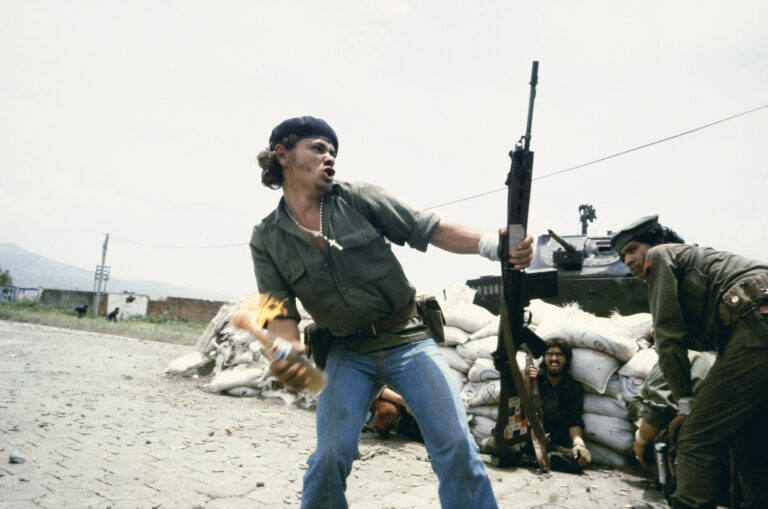
Susan Meiselas, Sandinistas at the walls of the Estelí National Guard headquarters, “Molotov Man,” Estelí, Nicaragua, July 16, 1979; © Susan Meiselas/Magnum Photos
SAN FRANCISCO, CA (March 21, 2018) — From war and human rights to cultural identity and domestic violence, American photographer Susan Meiselas’s work covers a wide range of themes and countries. On view at the San Francisco Museum of Modern Art (SFMOMA) July 21 through October 21, 2018, Susan Meiselas: Mediations brings together projects from the beginning of the artist’s career in the 1970s to the present day, including her iconic portraits of carnival strippers, vivid color images of the conflicts in Central America in the 1980s and an ongoing investigation into the history and aftermath of the Kurdish genocide.
A member of Magnum Photos since 1976, Meiselas creates work that raises provocative questions about documentary practice and the relationship between photographer and subject. This retrospective — Meiselas’s first on the West Coast — highlights her unique working method, combining photography, video, sound and installation to explore different scales of time and conflict, ranging from the personal to the geopolitical. SFMOMA is the exclusive U.S. venue for the exhibition.
“Photographs are immediate personal encounters that last only a moment,” said Meiselas. “These encounters may create a bridge for constructing larger narratives, which go beyond someone’s personal story to a wider national or cultural history. The picture is then merely the starting point.”
“Meiselas’s approach to her subjects is at once deeply ethical and profoundly inspiring,” said Corey Keller, curator of photography at SFMOMA. “She approaches her work with a clear guiding question: Whom do these photographs serve? Her insightful grasp of politics and history, coupled with an insatiable curiosity, gives her work an extraordinary power.”
Highlights of the exhibition include the following projects:
- Carnival Strippers (1972–75), one of her first major photographic projects, follows women working as strippers in itinerant carnivals in New England over the course of three consecutive summers. Meiselas completed the black-and-white series with audio recordings of the women, their clients and managers, publishing a multi-perspective testimony in 1976.
- Mediations (1978–82) and The Life of an Image: Molotov Man (1979–2018) retrace the history of the images Meiselas made in Central American conflict zones, including her now-iconic color photographs of the Nicaraguan insurrection, and the contexts in which they have been published or reappropriated. During the course of her extensive travels in Nicaragua, Meiselas returned to the sites where she took the original photographs, using the images to find the people she had photographed and film their reflections a decade after their first encounters. On the 25th anniversary she returned again, placing murals of her photographs in the landscape as a way to interrogate the role of the image in historical memory.
- Kurdistan: In The Shadow of History (1991–2007) is a multimedia project comprising photographs, videos, documents and oral accounts collected by the artist after arriving in northern Iraq to photograph the evidence of the Kurdish genocide in the early 1990s. Subsequently, Meiselas continued to collaborate with the Kurdish diaspora, collecting stories for the online platform aka KURDISTAN. Now exhibited as a borderless “story map” of collective memory, it shares the history of a people dispersed throughout the world and the roles photographs play in shaping history.
- Archives of Abuse (1991–92), a public art project in San Francisco commissioned by the Liz Claiborne Foundation, brings together handwritten police reports and forensic photographs to raise public awareness about domestic violence. A Room of Their Own (2015–17), Meiselas’s latest work, is a multilayered visual story and collaboration with women survivors of domestic abuse in the United Kingdom, local artists and Multistory, a nonprofit arts organization.
- 20 dirhams or 1 photo? (2013–14), an installation from SFMOMA’s collection about the women working in Marrakech’s spice market, focuses on the question of power between photographer and subject. Meiselas set up a temporary studio in a spice market and asked local women to sit for her. The sitters decided if they wished to keep their portraits or be paid 20 dirhams in exchange for allowing Meiselas to keep the photographs and display them in an exhibition. This installation is on view exclusively in the SFMOMA presentation.
This exhibition is coproduced by Fundació Antoni Tàpies, Barcelona, and Jeu de Paume, Paris, in collaboration with the San Francisco Museum of Modern Art for its presentation in San Francisco. SFMOMA’s presentation of Susan Meiselas: Mediations is generously supported by Nion McEvoy and Kate and Wes Mitchell.
About Susan Meiselas
Susan Meiselas, born in Baltimore, Maryland, in 1948, received her BA from Sarah Lawrence College and her MA in visual education from Harvard University. Meiselas joined Magnum Photos in 1976 and, since then, has worked as a freelance photographer. She is best known for her coverage of the insurrection in Nicaragua and her documentation of human rights issues in Latin America. Meiselas has had one-woman exhibitions in Paris, Madrid, Amsterdam, London, Los Angeles, Chicago and New York, and her work is included in collections around the world. She has received the Robert Capa Gold Medal for her work in Nicaragua (1979); the Leica Award for Excellence (1982); the Engelhard Award from the Institute of Contemporary Art (1985); the Hasselblad Foundation Photography prize (1994); the Cornell Capa Infinity Award (2005); Harvard Arts Medal (2011); and, most recently, a Guggenheim Fellowship (2015). In 1992, she was named a MacArthur Fellow.
Catalogue
Susan Meiselas: Mediations is accompanied by an illustrated publication produced by Jeu de Paume, Damiani and Fundació Antoni Tàpies featuring texts by Ariella Azoulay, Eduardo Cadava, Carles Guerra, Marianne Hirsch, Corey Keller, Kristen Lubben, Isin Onol and Pia Viewing. The publication is available in French, English and Spanish versions.